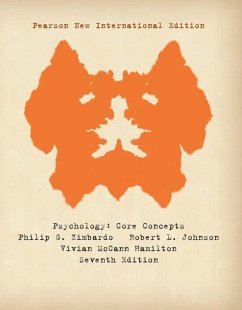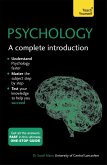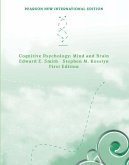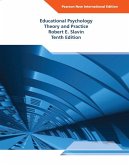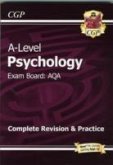Where great science meets great teaching.
At just fourteen chapters, Psychology: Core Concepts 7e provides rich coverage of the foundational topics taught in most introductory courses.
Psychology: Core Concepts focuses on a manageable number of core concepts (usually three to five) in each chapter, allowing students to attain a deeper level of understanding of the material. Learning is reinforced through focused application and critical thinking activities, and connections between concepts are drawn across chapters to help students see the big picture of psychology as a whole. The 7th edition features an enhanced critical thinking emphasis, with new chapter-opening "Problems" and new end-of-chapter critical thinking applications that promote active learning.
Teaching & Learning Experience
Personalize Learning — The new MyPsychLab delivers proven results in helping students succeed, provides engaging experiences that personalize learning, and comes from a trusted partner with educational expertise and a deep commitment to helping students and instructors achieve their goals.
Improve Critical Thinking — Pedagogical features are designed to help students learn the problem-solving skills and critical thinking techniques of a good psychologist.
Engage Students — In-text learning activities and the new MyPsychLab Video Series maintain student interest both in and out of the classroom.
Explore Research — Current research reflects the most up-to-date psychological theories and applications.
Understand Culture and Diversity — Cross-cultural, multicultural, and gender research is woven throughout the text to reflect the increasing diversity and global reach of psychology.
Support Instructors — An Instructor’s Manual, Test Bank (both print and computerized), Interactive PowerPoints, the new MyPsychLab Video Series, Telecourse Videos, and a Telecourse Study Guide provide instructors with the ultimate supplements package.
Preview Site: http://www.pearsonhighered.com/fall2011preview/#Psych Facebook Page: http://www.facebook.com/pages/Psychology-Core-Concepts/214526791978469 Features + Benefits
WHERE GREAT SCIENCE MEETS GREAT TEACHING.
“Psychology Matters” applications within each chapter section explore connections between psychology and everyday life, and promote critical thinking by helping students evaluate many of the psychological ideas they will encounter in popular press (e.g. emotional differences between men and women, the origin of sexual orientation, the side effects of psychoactive drugs, etc.). A special “Psychology Matters” section within each chapter focuses on Using Psychology to Learn Psychology, offering practical advice for increased academic success. (ex. p. 79)
“Connection" arrows link material across chapters, showing clear relationships between concepts in various topical areas. An explanatory note accompanies the marginal arrow, giving the reader a quick review or preview of the related discussion found in other chapters. This conveys to students that the discipline of psychology contains many interconnecting threads that weave together to provide meaning across topics, rather than functioning as a set of isolated facts and topics. (ex. p. 68)
The Discovering Psychology Viewing Guide at the end of each chapter in the text includes a program review and activities tied to the Discovering Psychology video series, helping students tie text concepts to what they see in the videos. Students can access the Discovering Psychology videos online through MyPsychLab whenever and wherever they want. They can also complete an online, automatically scored review quiz. (ex. p. 84)
PERSONALIZE LEARNING
The new MyPsychLab delivers proven results in helping students succeed, provides engaging experiences that personalize learning, and comes from a trusted partner with educational expertise and a deep commitment to helping students and instructors achieve their goals.
New MyPsychLab Video Series - This new video series offers the most current and cutting-edge introductory psychology video content. These exclusive half-hour videos take the viewer into today’s research laboratories, inside the body and brain, and onto the street to experience real-world applications. In MyPsychLab, students can also access the Discovering Psychology videos, which provide an overview of historic and current theories of human behavior, and feature many of the researchers and studies introduced in this textbook.
The New Experiments Tool, found in MyPsychLab, allows students to experience psychology through online experiments that reinforce class lessons and textbook content.
A New Read More section in MyPsychLab offers interested students the opportunity to explore topics that branch out from the core concepts presented in the text.
The Pearson eText allows students to access their textbook anytime, anywhere, and any way they want—including listening online or downloading to their iPad.
A personalized study plan for each student, based on Bloom’s Taxonomy, arranges content from less complex thinking—like remembering and understanding—to more complex critical thinking—like applying and analyzing. This layered approach promotes better critical-thinking skills, and helps students succeed in the course and beyond.
Assessment tied to every video, application, and chapter enables both instructors and students to track progress and get immediate feedback. With results feeding into a powerful gradebook, the assessment program helps instructors identify student challenges early—and find the best resources with which to help students.
An assignment calendar allows instructors to assign graded activities, with specific deadlines, and measure student progress.
Class Prep collects the very best class presentation resources in one convenient online destination, so instructors can keep students engaged throughout every class.
IMPROVE CRITICAL THINKING
Chapter Opening Problems are designed to get students engaged in the material from the onset. Students are encouraged to think through the problem as they read the chapter, using the core concepts presented to help them resolve the problem. A special effort has been made in this new edition to provide clues throughout the chapter that will help students understand the solution to the chapter-opening problem. The Chapter Summary now gives a brief “answer” to the problem as well. (ex. p. 40)
Critical Thinking applications at the end of each chapter help students become better consumers of scientific information and build upon the critical thinking skills introduced in the first chapter. (ex. p. 80)
“Do It Yourself!” learning activities offer simple demonstrations of psychological principles and allow students to actively apply psychological concepts alone or in groups, further enhancing their understanding. (ex. p. 81)
“Psychology Matters” applications within each chapter section explore connections between psychology and everyday life and promote critical thinking by helping students evaluate many of the psychological ideas they will encounter in popular press (e.g. emotional differences between men and women, the origin of sexual orientation, the side effects of psychoactive drugs, etc.). A special “Psychology Matters” section within each chapter focuses on Using Psychology to Learn Psychology, offering practical advice for increased academic success. (ex. p. 79)
A personalized study plan for each student, based on Bloom’s Taxonomy, arranges content from less complex thinking—like remembering and understanding—to more complex critical thinking—like applying and analyzing. This layered approach promotes better critical-thinking skills, and helps students succeed in the course and beyond.
ENGAGE STUDENTS
A “Key Question” opens each chapter section and a “Core Concept” is presented as a brief answer. These Key Questions and Core Concepts help students understand the big picture and guide them through the chapter material. Chapter overview maps and chapter-ending summaries are organized around the “Key Questions” and “Core Concepts” to further reinforce learning. (ex. p. 43)
Chapter Opening Problems are designed to get students engaged in the material from the onset. Students are encouraged to think through the problem as they read the chapter, using the core concepts presented to help them resolve the problem. A special effort has been made in this new edition to provide clues throughout the chapter that will help students understand the solution to the chapter-opening problem. (ex. p. 40) TheChapter Summary now gives a brief “answer” to the problem as well. (ex. p. 81)
“Check Your Understanding" self-tests within each chapter provide immediate reinforcement and help students assess what they know and where they need further study. Questions are broken down to focus on recall, analysis, or application of the material. One of the “Check Your Understanding” questions always focuses on the chapter's “Core Concept.” This approach is deliberately used to reinforce the student's use of the “Core Concepts.” (ex. p. 62)
“Do It Yourself!" learning activities offer simple demonstrations of psychological principles and allow students to actively apply psychological concepts alone or in groups, further enhancing their understanding. IN THIS SECTION:
1.) BRIEF
2.) COMPREHENSIVE
BRIEF TABLE OF CONTENTS:
Chapter 1: Mind, Behavior, and Psychological Science
Chapter 2: Biopsychology, Neuroscience, and Human Nature
Chapter 3: Sensation and Perception
Chapter 4: Learning and Human Nature
Chapter 5: Memory
Chapter 6: Thinking and Human Intelligence
Chapter 7: Development over the Lifespan
Chapter 8: States of Consciousness
Chapter 9: Motivation and Emotion
Chapter 10: Personality: Theories of the Whole Person
Chapter 11: Social Psychology
Chapter 12: Psychological Disorders
Chapter 13: Therapies for Psychological Disorders
Chapter 14: Stress, Health, and Well-Being
COMPREHENSIVE TABLE OF CONTENTS:
Chapter 1: Mind, Behavior, and Psychological Science
1.1 What Is Psychology – And What Is It Not?
Psychology: It’s More than You Think
Psychology Is Not Psychiatry
Thinking Critically about Psychology and Pseudopsychology
Psychology Matters: Using Psychology to Learn Psychology
1.3 What Are Psychology’s Six Main Perspectives?
Separation of Mind and Body and the Modern Biological Perspective
The Founding of Scientific Psychology and the Modern Cognitive Perspective
The Behavioral Perspective: Focusing on Observable Behavior
The Whole-Person Perspectives: Psychodynamic, Humanistic, Trait and Temperament
The Developmental Perspective: Changes Arising from Nature and Nurture
The Sociocultural Perspective: The Individual in Context
The Changing Face of Psychology
PSYCHOLOGY MATTERS: Psychology as a Major
1.2 How Do Psychologists Develop New Knowledge?
Four Steps in the Scientific Method
Five Types of Psychological Research
Controlling Biases in Psychological Research
Ethical Issues in Psychological Research
PSYCHOLOGY MATTERS: The Perils of Pseudopsychology
Critical Thinking Applied: Facilitated Communication
Chapter Summary
Discovering Psychology Viewing Guide
Chapter 2: Biopsychology, Neuroscience, and Human Nature
2.1 How Are Genes and Behavior Linked?
Evolution and Natural Selection
Genetics and Inheritance
PSYCHOLOGY MATTERS: Choosing Your Children’s Genes
2.2 How Does the Body Communicate Internally?
The Neuron: Building Block of the Nervous System
The Nervous System
The Endocrine System
PSYCHOLOGY MATTERS: How Psychoactive Drugs Affect the Nervous System
2.3 How Does the Brain Produce Behavior and Mental Processes?
Windows on the Brain
Three Layers of the Brain
Lobes of the Cerebral Cortex
Cerebral Dominance
PSYCHOLOGY MATTERS: Using Psychology to Learn Psychology
Critical Thinking Applied: Left Brain vs. Right Brain
Chapter Summary
Discovering Psychology Viewing Guide
Chapter 4: Learning and Human Nurture
4.1 What Sort of Learning Does Classical Conditioning Explain?
The Essentials of Classical Conditioning
Applications of Classical Conditioning
PSYCHOLOGY MATTERS: Taste Aversions and Chemotherapy
4.2 How Do We Learn New Behaviors by Operant Conditioning?
Skinner’s Radical Behaviorism
The Power of Reinforcement
The Problem of Punishment
A Checklist for Modifying Operant Behavior
Operant and Classical Conditioning Compared
PSYCHOLOGY MATTERS: Using Psychology to Learn Psychology
4.3 How Does Cognitive Psychology Explain Learning?
Insight Learning: Köhler in the Canaries with the Chimps
Cognitive Maps: Tolman Finds out What’s on a Rat’s Mind
Observational Learning: Bandura’s Challenge to Behaviorism
Rethinking Behavioral Learning in Cognitive Terms
Brain Mechanisms and Learning
“Higher” Cognitive Learning
PSYCHOLOGY MATTERS: Fear of Flying Revisited
Critical Thinking Applied: Do Different People Have Different “Learning Styles”?
Chapter Summary
Discovering Psychology Viewing Guide
Chapter 5: Memory
5.1 What Is Memory?
Metaphors for Memory
Memory’s Three Basic Tasks
PSYCHOLOGY MATTERS: Would You Want a “Photographic” Memory?
5.2 How Do We Form Memories?
The First Stage: Sensory Memory
The Second Stage: Working Memory
The Third Stage: Long-Term Memory
PSYCHOLOGY MATTERS: “Flashbulb” Memories: Where Were You When…?
5.3 How Do We Retrieve Memories?
Implicit and Explicit Memory
Retrieval Cues
Other Factors Affecting Retrieval
PSYCHOLOGY MATTERS: On the Tip of Your Tongue
5.4 Why Does Memory Sometimes Fail Us?
Transience: Fading Memories Cause Forgetting
Absent-Mindedness: Lapses of Attention Cause Forgetting
Blocking: Access Problems
Misattribution: Memories in the Wrong Context
Suggestibility: External Cues Distort or Create Memories
Bias: Beliefs, Attitudes, and Opinions Distort Memories
Persistence: When We Can’t Forget
The Advantages of the “Seven Sins” of Memory
Improving Your Memory with Mnemonics
PSYCHOLOGY MATTERS: Using Psychology to Learn Psychology
Critical Thinking Applied: The Recovered Memory Controversy
Chapter Summary
Discovering Psychology Viewing Guide
Chapter 6: Thinking and Intelligence
6.1 What Are the Components of Thought?
Concepts
Imagery and Cognitive Maps
Thought and the Brain
PSYCHOLOGY MATTERS: Schemas and Scripts Help You Know What to Expect
6.2 What Abilities Do Good Thinkers Possess?
Problem Solving
Judging and Making Decisions
On Becoming a Creative Genius
PSYCHOLOGY MATTERS: Using Psychology to Learn
Where great science meets great teaching. At just fourteen chapters, Psychology: Core Concepts 7e provides rich coverage of the foundational topics taught in most introductory courses. Psychology: Core Concepts focuses on a manageable number of core concepts (usually three to five) in each chapter, allowing students to attain a deeper level of understanding of the material. Learning is reinforced through focused application and critical thinking activities, and connections between concepts are drawn across chapters to help students see the big picture of psychology as a whole. The 7th edition features an enhanced critical thinking emphasis, with new chapter-opening "Problems" and new end-of-chapter critical thinking applications that promote active learning. Teaching & Learning Experience * Personalize Learning ? The new MyPsychLab delivers proven results in helping students succeed, provides engaging experiences that personalize learning, and comes from a trusted partner with educational expertise and a deep commitment to helping students and instructors achieve their goals. * Improve Critical Thinking ? Pedagogical features are designed to help students learn the problem-solving skills and critical thinking techniques of a good psychologist. * Engage Students ? In-text learning activities and the new MyPsychLab Video Series maintain student interest both in and out of the classroom. * Explore Research ? Current research reflects the most up-to-date psychological theories and applications. * Understand Culture and Diversity ? Cross-cultural, multicultural, and gender research is woven throughout the text to reflect the increasing diversity and global reach of psychology. * Support Instructors ? An Instructor's Manual, Test Bank (both print and computerized), Interactive PowerPoints, the new MyPsychLab Video Series, Telecourse Videos, and a Telecourse Study Guide provide instructors with the ultimate supplements package. Preview Site: Facebook Page:
Hinweis: Dieser Artikel kann nur an eine deutsche Lieferadresse ausgeliefert werden.
At just fourteen chapters, Psychology: Core Concepts 7e provides rich coverage of the foundational topics taught in most introductory courses.
Psychology: Core Concepts focuses on a manageable number of core concepts (usually three to five) in each chapter, allowing students to attain a deeper level of understanding of the material. Learning is reinforced through focused application and critical thinking activities, and connections between concepts are drawn across chapters to help students see the big picture of psychology as a whole. The 7th edition features an enhanced critical thinking emphasis, with new chapter-opening "Problems" and new end-of-chapter critical thinking applications that promote active learning.
Teaching & Learning Experience
Personalize Learning — The new MyPsychLab delivers proven results in helping students succeed, provides engaging experiences that personalize learning, and comes from a trusted partner with educational expertise and a deep commitment to helping students and instructors achieve their goals.
Improve Critical Thinking — Pedagogical features are designed to help students learn the problem-solving skills and critical thinking techniques of a good psychologist.
Engage Students — In-text learning activities and the new MyPsychLab Video Series maintain student interest both in and out of the classroom.
Explore Research — Current research reflects the most up-to-date psychological theories and applications.
Understand Culture and Diversity — Cross-cultural, multicultural, and gender research is woven throughout the text to reflect the increasing diversity and global reach of psychology.
Support Instructors — An Instructor’s Manual, Test Bank (both print and computerized), Interactive PowerPoints, the new MyPsychLab Video Series, Telecourse Videos, and a Telecourse Study Guide provide instructors with the ultimate supplements package.
Preview Site: http://www.pearsonhighered.com/fall2011preview/#Psych Facebook Page: http://www.facebook.com/pages/Psychology-Core-Concepts/214526791978469 Features + Benefits
WHERE GREAT SCIENCE MEETS GREAT TEACHING.
“Psychology Matters” applications within each chapter section explore connections between psychology and everyday life, and promote critical thinking by helping students evaluate many of the psychological ideas they will encounter in popular press (e.g. emotional differences between men and women, the origin of sexual orientation, the side effects of psychoactive drugs, etc.). A special “Psychology Matters” section within each chapter focuses on Using Psychology to Learn Psychology, offering practical advice for increased academic success. (ex. p. 79)
“Connection" arrows link material across chapters, showing clear relationships between concepts in various topical areas. An explanatory note accompanies the marginal arrow, giving the reader a quick review or preview of the related discussion found in other chapters. This conveys to students that the discipline of psychology contains many interconnecting threads that weave together to provide meaning across topics, rather than functioning as a set of isolated facts and topics. (ex. p. 68)
The Discovering Psychology Viewing Guide at the end of each chapter in the text includes a program review and activities tied to the Discovering Psychology video series, helping students tie text concepts to what they see in the videos. Students can access the Discovering Psychology videos online through MyPsychLab whenever and wherever they want. They can also complete an online, automatically scored review quiz. (ex. p. 84)
PERSONALIZE LEARNING
The new MyPsychLab delivers proven results in helping students succeed, provides engaging experiences that personalize learning, and comes from a trusted partner with educational expertise and a deep commitment to helping students and instructors achieve their goals.
New MyPsychLab Video Series - This new video series offers the most current and cutting-edge introductory psychology video content. These exclusive half-hour videos take the viewer into today’s research laboratories, inside the body and brain, and onto the street to experience real-world applications. In MyPsychLab, students can also access the Discovering Psychology videos, which provide an overview of historic and current theories of human behavior, and feature many of the researchers and studies introduced in this textbook.
The New Experiments Tool, found in MyPsychLab, allows students to experience psychology through online experiments that reinforce class lessons and textbook content.
A New Read More section in MyPsychLab offers interested students the opportunity to explore topics that branch out from the core concepts presented in the text.
The Pearson eText allows students to access their textbook anytime, anywhere, and any way they want—including listening online or downloading to their iPad.
A personalized study plan for each student, based on Bloom’s Taxonomy, arranges content from less complex thinking—like remembering and understanding—to more complex critical thinking—like applying and analyzing. This layered approach promotes better critical-thinking skills, and helps students succeed in the course and beyond.
Assessment tied to every video, application, and chapter enables both instructors and students to track progress and get immediate feedback. With results feeding into a powerful gradebook, the assessment program helps instructors identify student challenges early—and find the best resources with which to help students.
An assignment calendar allows instructors to assign graded activities, with specific deadlines, and measure student progress.
Class Prep collects the very best class presentation resources in one convenient online destination, so instructors can keep students engaged throughout every class.
IMPROVE CRITICAL THINKING
Chapter Opening Problems are designed to get students engaged in the material from the onset. Students are encouraged to think through the problem as they read the chapter, using the core concepts presented to help them resolve the problem. A special effort has been made in this new edition to provide clues throughout the chapter that will help students understand the solution to the chapter-opening problem. The Chapter Summary now gives a brief “answer” to the problem as well. (ex. p. 40)
Critical Thinking applications at the end of each chapter help students become better consumers of scientific information and build upon the critical thinking skills introduced in the first chapter. (ex. p. 80)
“Do It Yourself!” learning activities offer simple demonstrations of psychological principles and allow students to actively apply psychological concepts alone or in groups, further enhancing their understanding. (ex. p. 81)
“Psychology Matters” applications within each chapter section explore connections between psychology and everyday life and promote critical thinking by helping students evaluate many of the psychological ideas they will encounter in popular press (e.g. emotional differences between men and women, the origin of sexual orientation, the side effects of psychoactive drugs, etc.). A special “Psychology Matters” section within each chapter focuses on Using Psychology to Learn Psychology, offering practical advice for increased academic success. (ex. p. 79)
A personalized study plan for each student, based on Bloom’s Taxonomy, arranges content from less complex thinking—like remembering and understanding—to more complex critical thinking—like applying and analyzing. This layered approach promotes better critical-thinking skills, and helps students succeed in the course and beyond.
ENGAGE STUDENTS
A “Key Question” opens each chapter section and a “Core Concept” is presented as a brief answer. These Key Questions and Core Concepts help students understand the big picture and guide them through the chapter material. Chapter overview maps and chapter-ending summaries are organized around the “Key Questions” and “Core Concepts” to further reinforce learning. (ex. p. 43)
Chapter Opening Problems are designed to get students engaged in the material from the onset. Students are encouraged to think through the problem as they read the chapter, using the core concepts presented to help them resolve the problem. A special effort has been made in this new edition to provide clues throughout the chapter that will help students understand the solution to the chapter-opening problem. (ex. p. 40) TheChapter Summary now gives a brief “answer” to the problem as well. (ex. p. 81)
“Check Your Understanding" self-tests within each chapter provide immediate reinforcement and help students assess what they know and where they need further study. Questions are broken down to focus on recall, analysis, or application of the material. One of the “Check Your Understanding” questions always focuses on the chapter's “Core Concept.” This approach is deliberately used to reinforce the student's use of the “Core Concepts.” (ex. p. 62)
“Do It Yourself!" learning activities offer simple demonstrations of psychological principles and allow students to actively apply psychological concepts alone or in groups, further enhancing their understanding. IN THIS SECTION:
1.) BRIEF
2.) COMPREHENSIVE
BRIEF TABLE OF CONTENTS:
Chapter 1: Mind, Behavior, and Psychological Science
Chapter 2: Biopsychology, Neuroscience, and Human Nature
Chapter 3: Sensation and Perception
Chapter 4: Learning and Human Nature
Chapter 5: Memory
Chapter 6: Thinking and Human Intelligence
Chapter 7: Development over the Lifespan
Chapter 8: States of Consciousness
Chapter 9: Motivation and Emotion
Chapter 10: Personality: Theories of the Whole Person
Chapter 11: Social Psychology
Chapter 12: Psychological Disorders
Chapter 13: Therapies for Psychological Disorders
Chapter 14: Stress, Health, and Well-Being
COMPREHENSIVE TABLE OF CONTENTS:
Chapter 1: Mind, Behavior, and Psychological Science
1.1 What Is Psychology – And What Is It Not?
Psychology: It’s More than You Think
Psychology Is Not Psychiatry
Thinking Critically about Psychology and Pseudopsychology
Psychology Matters: Using Psychology to Learn Psychology
1.3 What Are Psychology’s Six Main Perspectives?
Separation of Mind and Body and the Modern Biological Perspective
The Founding of Scientific Psychology and the Modern Cognitive Perspective
The Behavioral Perspective: Focusing on Observable Behavior
The Whole-Person Perspectives: Psychodynamic, Humanistic, Trait and Temperament
The Developmental Perspective: Changes Arising from Nature and Nurture
The Sociocultural Perspective: The Individual in Context
The Changing Face of Psychology
PSYCHOLOGY MATTERS: Psychology as a Major
1.2 How Do Psychologists Develop New Knowledge?
Four Steps in the Scientific Method
Five Types of Psychological Research
Controlling Biases in Psychological Research
Ethical Issues in Psychological Research
PSYCHOLOGY MATTERS: The Perils of Pseudopsychology
Critical Thinking Applied: Facilitated Communication
Chapter Summary
Discovering Psychology Viewing Guide
Chapter 2: Biopsychology, Neuroscience, and Human Nature
2.1 How Are Genes and Behavior Linked?
Evolution and Natural Selection
Genetics and Inheritance
PSYCHOLOGY MATTERS: Choosing Your Children’s Genes
2.2 How Does the Body Communicate Internally?
The Neuron: Building Block of the Nervous System
The Nervous System
The Endocrine System
PSYCHOLOGY MATTERS: How Psychoactive Drugs Affect the Nervous System
2.3 How Does the Brain Produce Behavior and Mental Processes?
Windows on the Brain
Three Layers of the Brain
Lobes of the Cerebral Cortex
Cerebral Dominance
PSYCHOLOGY MATTERS: Using Psychology to Learn Psychology
Critical Thinking Applied: Left Brain vs. Right Brain
Chapter Summary
Discovering Psychology Viewing Guide
Chapter 4: Learning and Human Nurture
4.1 What Sort of Learning Does Classical Conditioning Explain?
The Essentials of Classical Conditioning
Applications of Classical Conditioning
PSYCHOLOGY MATTERS: Taste Aversions and Chemotherapy
4.2 How Do We Learn New Behaviors by Operant Conditioning?
Skinner’s Radical Behaviorism
The Power of Reinforcement
The Problem of Punishment
A Checklist for Modifying Operant Behavior
Operant and Classical Conditioning Compared
PSYCHOLOGY MATTERS: Using Psychology to Learn Psychology
4.3 How Does Cognitive Psychology Explain Learning?
Insight Learning: Köhler in the Canaries with the Chimps
Cognitive Maps: Tolman Finds out What’s on a Rat’s Mind
Observational Learning: Bandura’s Challenge to Behaviorism
Rethinking Behavioral Learning in Cognitive Terms
Brain Mechanisms and Learning
“Higher” Cognitive Learning
PSYCHOLOGY MATTERS: Fear of Flying Revisited
Critical Thinking Applied: Do Different People Have Different “Learning Styles”?
Chapter Summary
Discovering Psychology Viewing Guide
Chapter 5: Memory
5.1 What Is Memory?
Metaphors for Memory
Memory’s Three Basic Tasks
PSYCHOLOGY MATTERS: Would You Want a “Photographic” Memory?
5.2 How Do We Form Memories?
The First Stage: Sensory Memory
The Second Stage: Working Memory
The Third Stage: Long-Term Memory
PSYCHOLOGY MATTERS: “Flashbulb” Memories: Where Were You When…?
5.3 How Do We Retrieve Memories?
Implicit and Explicit Memory
Retrieval Cues
Other Factors Affecting Retrieval
PSYCHOLOGY MATTERS: On the Tip of Your Tongue
5.4 Why Does Memory Sometimes Fail Us?
Transience: Fading Memories Cause Forgetting
Absent-Mindedness: Lapses of Attention Cause Forgetting
Blocking: Access Problems
Misattribution: Memories in the Wrong Context
Suggestibility: External Cues Distort or Create Memories
Bias: Beliefs, Attitudes, and Opinions Distort Memories
Persistence: When We Can’t Forget
The Advantages of the “Seven Sins” of Memory
Improving Your Memory with Mnemonics
PSYCHOLOGY MATTERS: Using Psychology to Learn Psychology
Critical Thinking Applied: The Recovered Memory Controversy
Chapter Summary
Discovering Psychology Viewing Guide
Chapter 6: Thinking and Intelligence
6.1 What Are the Components of Thought?
Concepts
Imagery and Cognitive Maps
Thought and the Brain
PSYCHOLOGY MATTERS: Schemas and Scripts Help You Know What to Expect
6.2 What Abilities Do Good Thinkers Possess?
Problem Solving
Judging and Making Decisions
On Becoming a Creative Genius
PSYCHOLOGY MATTERS: Using Psychology to Learn
Where great science meets great teaching. At just fourteen chapters, Psychology: Core Concepts 7e provides rich coverage of the foundational topics taught in most introductory courses. Psychology: Core Concepts focuses on a manageable number of core concepts (usually three to five) in each chapter, allowing students to attain a deeper level of understanding of the material. Learning is reinforced through focused application and critical thinking activities, and connections between concepts are drawn across chapters to help students see the big picture of psychology as a whole. The 7th edition features an enhanced critical thinking emphasis, with new chapter-opening "Problems" and new end-of-chapter critical thinking applications that promote active learning. Teaching & Learning Experience * Personalize Learning ? The new MyPsychLab delivers proven results in helping students succeed, provides engaging experiences that personalize learning, and comes from a trusted partner with educational expertise and a deep commitment to helping students and instructors achieve their goals. * Improve Critical Thinking ? Pedagogical features are designed to help students learn the problem-solving skills and critical thinking techniques of a good psychologist. * Engage Students ? In-text learning activities and the new MyPsychLab Video Series maintain student interest both in and out of the classroom. * Explore Research ? Current research reflects the most up-to-date psychological theories and applications. * Understand Culture and Diversity ? Cross-cultural, multicultural, and gender research is woven throughout the text to reflect the increasing diversity and global reach of psychology. * Support Instructors ? An Instructor's Manual, Test Bank (both print and computerized), Interactive PowerPoints, the new MyPsychLab Video Series, Telecourse Videos, and a Telecourse Study Guide provide instructors with the ultimate supplements package. Preview Site: Facebook Page:
Hinweis: Dieser Artikel kann nur an eine deutsche Lieferadresse ausgeliefert werden.

